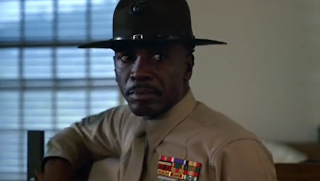5. Charles Durning in The Best Little Whorehouse in Texas- Durning although may be the best part of the film, still does not make a particularly substantial impact with his small amount of screentime, that is mostly made up of a very unspectacular musical number.
4. Robert Preston in Victor Victoria- Preston gives a standard Preston performance which most certainly is charming but also not particularly special. It is not even the best case of Preston doing Preston.
3. Lou Gossett, Jr. in An Officer and A Gentleman- Gossett is convincing and capable as an intense drill Sergeant, he also is very good in inserting subtle indications of the more humane characterizations of the man.
2. John Lithgow in The World According to Garp- John Lithgow never overacts in his role as a transsexual and instead gives a nicely heartfelt performance.
1.James Mason in The Verdict- This win easily goes to James Mason who thoroughly proves his strength as an actor in the role of the ace attorney in this film. He gives an excellent quietly dominating performance that creating the perfect sort of adversary in the film.
Deserving Performances:
Rutger Hauer in Blade Runner
Charles Durning in Tootsie
4. Robert Preston in Victor Victoria- Preston gives a standard Preston performance which most certainly is charming but also not particularly special. It is not even the best case of Preston doing Preston.
3. Lou Gossett, Jr. in An Officer and A Gentleman- Gossett is convincing and capable as an intense drill Sergeant, he also is very good in inserting subtle indications of the more humane characterizations of the man.
2. John Lithgow in The World According to Garp- John Lithgow never overacts in his role as a transsexual and instead gives a nicely heartfelt performance.
1.James Mason in The Verdict- This win easily goes to James Mason who thoroughly proves his strength as an actor in the role of the ace attorney in this film. He gives an excellent quietly dominating performance that creating the perfect sort of adversary in the film.
Deserving Performances:
Rutger Hauer in Blade Runner
Charles Durning in Tootsie






























